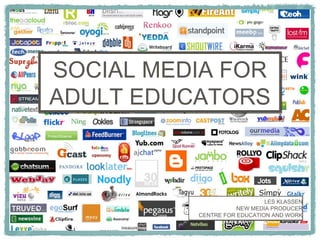ASEC: Social Media in the Classroom
- 1. SOCIAL MEDIA FOR ADULT EDUCATORS LES KLASSEN NEW MEDIA PRODUCER CENTRE FOR EDUCATION AND WORK
- 2. My Background Using computers since 1982 Early adopter of the Internet, 1994 Arts degree, 1999 TV / Radio Broadcasting Diploma, 2005 Wrote & directed for Frantic Films Work for adult education development company since 2001
- 3. TODAYĪ»s AGENDA 1 HOW MEDIA HAS CHANGED 2 BLOGS 3 TWITTER
- 4. WHAT IS SOCIAL MEDIA Social media uses Internet and web-based technologies to transform broadcast media monologues (one to many) into social media dialogues (many to many).
- 5. Dr. Allison Rossett STUFF STIR
- 6. STUFF & STIR EXAMPLE STUFF
- 7. STUFF & STIR EXAMPLE STUFF STIR
- 10. ONE BLOGGING MODEL CLASS LEARNER1 LEARNER2 LEARNER3 LEARNER4 BLOG BLOG BLOG BLOG BLOG Post 1 Post 1 Post 1 Post 2 Post 1 Comment Comment Comment Comment Comment Comment Post 2 Post 2 Comment Comment Post 2 Comment Comment Comment Post 2 Post 2 Comment
- 11. BLOG DEMO SAMPLE BLOG http://www.teachandlearn.ca/blog/ SIGN UP blogger.com
- 12. BLOG DEMO THE DASHBOARD VIEW
- 13. BLOG DEMO MAKING A POST LEAVING A COMMENT
- 14. MICRO BLOGGING
- 15. Application: The Twitter Experiment http://www.readwriteweb.com/archives/ how_one_teacher_uses_twitter_in_the_ classroom.php
- 16. Summary Overcome fears Another way to be heard A way to share glossary terms Share knowledge across the globe Forces focus at 140 chars Remote Presence LearnerĪ»s think itĪ»s cool
- 17. THE MODEL Learners and Instructors signup for Twitter. Learners and Instructors tweet out glossary terms & discussion points. Instructor projects tweets to the class.
- 18. DEMO
- 19. # Tags
- 20. Twitter Experiment Conclusions http://www.utdallas.edu/~mrankin/ usweb/twitterconclusions.htm
- 21. PODCASTS An audio or video ?le that is pushed to your Podcatcher.
- 22. ITUNES IS THE EASIEST PODCATCHER
- 23. PODCASTS DEMONSTRATION The iTunes Store iTunes University Teacher 2.0 Looking for extended information (TWIT.TV)
- 24. Subscribe to interesting podcasts and play them in class. Assign a required podcast as additional resources for learners. Create your own podcast with lecture highlights or additional supplemental content. Subscribe to podcasts as a form of professional development.
- 25. Podcast Resources YouTube Video http://www.youtube.com/watch?v=o4rz0jSXvG8 AppleĪ»s Website (for Mac Users) http://www.seminars.apple.com/seminarsonline/podcastproducer/ apple/ Mahalo.com Resources http://www.mahalo.com/how-to-make-a-podcast About.com http://radio.about.com/od/podcastin1/a/aa030805a.htm
- 26. Social Networks http://www.youtube.com/watch? v=6a_KF7TYKVc
- 27. Social Networks Characteristics 1. Pro?le Page 2. Friends 3. A Wall 4. Info Page 5. Photo 6. Video 7. A Messaging System 8. Additional Characteristics vary by network.
- 28. Social Networks Example 2: Ning.com http://www.classroom20.com
- 29. Social Networks Setting Up Your Own Ning Network www.ning.com
- 30. Additional Technologies http://www.wallwisher.com/
- 31. lklassen@cewca.org Les Klassen New Media Producer Centre for Education and Work www.thelearningtreefort.com http://www.cewca.org






























